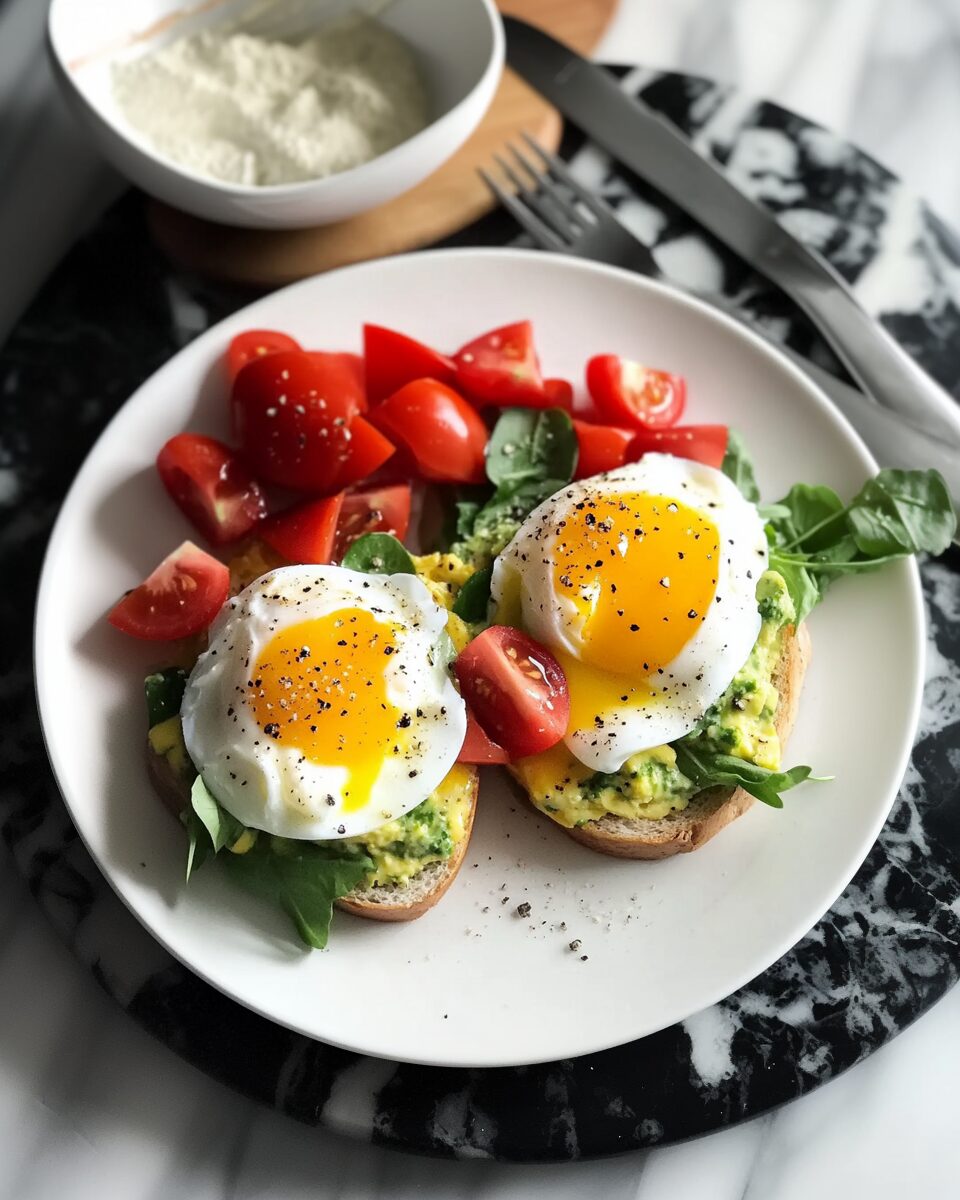Poached eggs are a simple and elegant addition to many dishes, offering a silky yolk encased in tender whites. This method ensures perfectly poached eggs in just 3 minutes, ideal for topping avocado toast, salads, or grain bowls. The key lies in using super fresh eggs and a gentle cooking technique.
Full Recipe:
Ingredients
- 1 very fresh, large egg
- 1 tablespoon white vinegar
- 1 teaspoon table salt
Directions
- Fill a large, deep pot with about 6 quarts of water. Bring to a rolling boil over high heat.
- While waiting for the water to boil, crack the egg into a fine mesh strainer to filter out any watery egg white parts. Gently transfer the egg to a ramekin or small bowl.
- Once the water is boiling, stir in the vinegar and salt. Turn off the heat and very gently slide the egg into the water. Immediately cover with a tight-fitting lid.
- Steep the egg for 3 minutes.
- Use a slotted spoon to gently remove the egg, starting with the one that went in first.
- Serve immediately.
Nutritional Facts (per serving)
- Calories: 72 kcal
- Protein: 6.3 g
- Fat: 4.8 g
- Saturated Fat: 1.6 g
- Cholesterol: 186 mg
- Sodium: 71 mg
- Carbohydrates: 0.4 g
- Sugar: 0.2 g
The Origins of Poached Eggs
The tradition of poaching eggs dates back centuries, with some sources tracing its origins to French cuisine. The word “poach” is derived from the Old French term “pochier,” meaning to cook in liquid. Though the technique itself has been around for a long time, poached eggs gained widespread popularity due to their elegant and healthy nature. As time has gone on, poached eggs have been embraced in various cultures and cuisines, becoming a staple in breakfast menus around the world.
While poached eggs are often associated with fine dining or gourmet breakfasts, they are surprisingly easy to prepare. The process of poaching eggs has remained largely unchanged, focusing on gently cooking the egg in water without the use of oil or fat, keeping the dish light and healthy.
Why Choose Poached Eggs?
Poached eggs are not only visually appealing but also packed with nutritional benefits. The technique of cooking the eggs in water, rather than frying or scrambling them, preserves the integrity of the egg while keeping it low in fat. Unlike other cooking methods that require added oil or butter, poaching ensures a healthier alternative while still retaining a rich flavor.
Nutritional Benefits of Poached Eggs
Eggs are a powerhouse of nutrition, and poached eggs are no exception. They are an excellent source of protein, healthy fats, and essential vitamins and minerals. A single poached egg contains approximately 6 grams of high-quality protein, making it a great choice for building and repairing tissues. They also provide essential nutrients such as vitamin B12, riboflavin, and folate, which are important for energy production and overall well-being.
Moreover, poached eggs contain healthy fats, including omega-3 fatty acids, which have been linked to numerous health benefits, including improved heart health and brain function. The low-fat nature of poached eggs makes them a suitable option for those looking to maintain or lose weight while still getting the necessary nutrients.
Poached eggs also provide a natural source of choline, a nutrient important for brain function and liver health. Choline helps in the production of acetylcholine, a neurotransmitter involved in memory and muscle control. This makes poached eggs a great addition to a brain-boosting diet.
Versatility of Poached Eggs in Cooking
Poached eggs are incredibly versatile and can be enjoyed in a wide range of dishes. Their mild flavor and soft texture make them an excellent addition to both savory and sweet meals. Here are just a few ways to incorporate poached eggs into your cooking:
-
Avocado Toast with Poached Eggs: One of the most popular ways to enjoy poached eggs is by serving them on top of avocado toast. The creamy avocado pairs perfectly with the runny yolk, creating a delicious and nutritious meal. Add some seasoning like chili flakes, lemon juice, or microgreens to enhance the flavor.
-
Poached Eggs on Salads: Poached eggs are a great topping for salads. Their richness adds a layer of depth to the dish, while the soft yolk acts as a natural dressing. Whether paired with a leafy green salad, roasted vegetables, or quinoa, poached eggs make an excellent addition to any salad.
-
Eggs Benedict: This classic dish features poached eggs served on an English muffin with Canadian bacon and topped with hollandaise sauce. Eggs Benedict is a popular brunch item that combines the rich flavor of the poached egg with the buttery sauce, creating a decadent and satisfying meal.
-
Grain Bowls: Poached eggs are often featured in grain bowls, where they add a source of protein and richness. Combine the egg with quinoa, brown rice, or farro, and top with vegetables, herbs, and a flavorful dressing for a balanced and nutritious meal.
-
Soup Garnish: Poached eggs can also be served as a garnish for soups. Their smooth texture and rich yolk provide a comforting and satisfying element to brothy or creamy soups, such as a classic French onion soup or a vegetable-based broth.
-
Sandwiches and Burgers: For an extra layer of flavor and texture, poached eggs can be added to sandwiches and burgers. The creamy yolk acts as a natural sauce, enriching the overall taste and providing a satisfying contrast to the other ingredients.
The Art of Poaching Eggs
Poaching eggs may seem intimidating at first, but with a few simple steps, you can achieve perfectly poached eggs every time. The key is to use fresh eggs and control the water temperature carefully. Fresh eggs have firmer whites, which hold their shape better in the water, making them ideal for poaching.
One common challenge when poaching eggs is ensuring that the egg white doesn’t spread too much in the water. This is where vinegar comes into play. Adding a small amount of vinegar to the water helps the egg whites coagulate more quickly, preventing them from dispersing too much. It’s important to use a gentle simmer rather than a rolling boil, as boiling water can cause the eggs to break apart or cook unevenly.
To achieve the perfect poached egg, it’s important to monitor the cooking time carefully. The egg should be cooked just long enough for the whites to firm up, but the yolk should remain soft and runny. Typically, poaching for about 3-4 minutes will result in a perfectly cooked egg with a runny yolk.
How to Make Poached Eggs in Advance
While poached eggs are best enjoyed immediately after they are cooked, it’s possible to make them in advance for a quick and easy meal. To make poached eggs ahead of time, simply poach the eggs as you normally would, then place them in a bowl of ice water to stop the cooking process. Once cooled, store the eggs in the refrigerator for up to 2 days.
When you’re ready to eat, gently reheat the eggs by placing them in a bowl of hot water for about 1-2 minutes. This will warm the eggs without overcooking them, ensuring that the yolk remains soft and runny.
Common Mistakes to Avoid When Poaching Eggs
While poaching eggs is a relatively straightforward technique, there are a few common mistakes to avoid:
-
Using Old Eggs: Older eggs tend to spread out in the water and result in a less aesthetically pleasing poached egg. Always use fresh eggs for the best results.
-
Water Temperature: Boiling water is too hot for poaching eggs. It’s essential to keep the water at a gentle simmer, around 180-190°F (82-88°C). Too much heat can cause the eggs to break apart.
-
Not Using Vinegar: The addition of vinegar helps the egg whites set more quickly and prevents them from dispersing in the water. Don’t skip this step.
-
Overcooking: Overcooked poached eggs will result in a firm yolk, which defeats the purpose of having a runny yolk. Be sure to monitor the cooking time and remove the eggs promptly when they are done.
-
Not Using the Right Equipment: A fine-mesh strainer and a slotted spoon are useful tools for handling poached eggs. They help ensure that the eggs stay intact during the cooking process and make it easier to remove them from the water.
Conclusion
Poached eggs are a delicious and nutritious addition to any meal, offering versatility and elegance without the need for complex ingredients or techniques. Whether served on toast, in salads, or as part of a more elaborate dish, poached eggs bring a rich, velvety texture and an indulgent flavor to the table. With their numerous health benefits, including high-quality protein, essential vitamins, and healthy fats, poached eggs are a great option for a balanced and satisfying meal.






